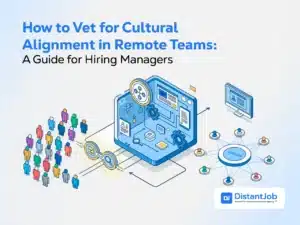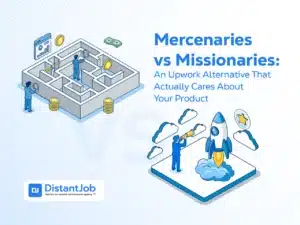Some IT tasks your company runs need developers who are specialists in a specific niche. Others require generalists with a variety of IT skill sets. It’s safe to say the decision between hiring specialists vs a generalist developer depends on the tasks and roles.
For example, is your IT project centered on a specific type of software, or does it require a more open-ended approach? Specialist developers are suitable for specific tasks that require particular skills, but generalist developers are optimal for IT roles that require a broad skill set.
This blog article explores specialist vs generalist pros and cons, as well as the circumstances under which you should consider either choice. We also explain why having both specialist and generalist developers can be helpful for a balanced development team.
Key Differences between Specialist and Generalist Developers
Specialist and generalist developers exist at various levels of IT and development roles. But what sets them apart?
What is a Specialist Developer?
A specialist developer is an IT expert who focuses their skill set and expertise on a particular area of IT development. They may be experts in specific programming languages, frameworks, or technology stack.
The skills they have honed within their area of expertise provides them with an in-depth understanding of the tools and IT industry best practices.
What is a Generalist Developer?
A generalist developer is an IT professional with broader skills and knowledge. They’re well-versed in multiple programming languages and frameworks, allowing them to adapt to various project requirements and DevOps tools.
Generalist developers have a broad spectrum of knowledge of IT development. A full-stack developer can be viewed as one due to their contribution to web development’s frontend, backend, and databases.
The key difference between specialist and generalist developers lies in their depth of expertise. Specialists excel at solving complex problems within their niche, while generalists are adept at navigating different domains and bringing a versatile skill set.
Specialist developers are your go-to individuals if you have a problem requiring a particular set of skills and experience. On the other hand, because generalists aren’t focused on just one way of doing things, you need them for IT projects that require different approaches.
Depending on your project needs, you can only hire a specialist or a generalist developer if they guarantee the successful completion of your project initiatives.
Advantages and Disadvantages of Hiring a Specialist Developer
Specialist developers are highly proficient and knowledgeable in their chosen field. For example, a .NET developer specializes in designing, implementing, and managing software applications using the Microsoft .NET framework. Their skill set includes relational SQL and proficiency in web development fundamentals, including HTML and CSS.
Pros
A specialist developer brings deep, specialized knowledge and skills in a particular technology or domain, ensuring high-quality, efficient, and reliable solutions.
Specialist developers can work faster and more effectively within their area of expertise, leading to quicker project completion timelines.
Specialists are often at the forefront of their field, bringing innovative ideas and cutting-edge techniques to the table.
Cons
One of the cons of hiring specialist developers is that they often command higher salaries due to their in-demand skills and expertise.
They may be less adaptable to working on tasks outside their area of focus, which can limit their usefulness in a diverse project environment
Relying solely on a specialist developer may leave gaps in your team’s overall technical capabilities, making it difficult to handle tasks outside the specialist’s domain.
Advantages and Disadvantages of Hiring a Generalist Developer
Generalist developers perform various IT roles due to their vast skill set. In software development, a generalist is proficient in numerous areas, such as mobile app development, database management, or UI/UX design.
Although they may have a limited depth of expertise compared to specialists in these areas, their versatility is valuable in dynamic project environments.
Pros:
- Hiring a generalist developer helps you build a cost-effective development team than assembling a team of specialists
- Generalists can more easily communicate and collaborate with team members from various backgrounds and disciplines
- As project needs change, it’s easier for a generalist developer to quickly pivot and take on new responsibilities.
Cons:
- Generalists may have a different level of in-depth expertise than specialists in a particular technology or domain.
- Without specialized skills, the quality of work produced by a generalist developer may not be as high as that of a specialist
- Generalists may not be as well-equipped to push the boundaries of technology or introduce groundbreaking solutions.
When to Hire a Specialist Developer
When your team’s development needs become increasingly complex and specialized, hiring a specialist developer who can provide deep expertise in a particular area makes more sense.
Specialist developers can bring unparalleled knowledge and skills to tackle complex technical challenges, optimize performance, and deliver tailored solutions to your specific requirements.
Similarly, if you’re working on a mission-critical project with unique technical needs or require advanced capabilities, investing in a specialist developer can be a wise and cost-effective decision in the long run.
When to Hire a Generalist Developer
A generalist developer can be a valuable asset when you need a more versatile and adaptable team member. Generalists possess many skills and can tackle various development tasks, from frontend to backend, and database management to DevOps.
They excel at quickly learning new technologies and can provide a flexible, cost-effective solution for projects with evolving requirements or where you need to maintain a lean development team.
Generalist developers also serve as a bridge between different specialties, facilitating collaboration and ensuring seamless integration across your entire development ecosystem.
Consider Using a Hybrid Approach When building a development team, it’s essential to strike a balance between hiring specialists and generalists, leveraging the strengths of each to create a cost-effective and competent hybrid development team.
Specialist developers bring expertise in specific technologies or domains, while generalist developers offer a variety of skill set. This combination allows you to tackle complex challenges efficiently without hiring a team of highly specialized (and often more expensive) developers.
The advantages of a hybrid development team are numerous. Specialist developers will tackle complex, niche-specific tasks, ensuring your project’s technical foundations are rock-solid. Generalist developers, on the other hand, will provide versatility, adapting to changing requirements and filling in gaps as needed.
This balanced and hybrid development team can lead to faster development cycles, better collaboration, and a more agile response to the changing industry demands.
Conclusion
Building a successful software development team requires establishing your needs and finding the best fit for the role. You must analyze your project needs and establish whether you need a specialist or generalist developer to fill in.
Start by listing specific skills and experiences your technical team requires for the project. Your ideal development team may also incorporate a hybrid approach, drawing on the strengths and skillsets of both specialist and generalist developers.
At DistantJob, we can help you build a team of developers that deliver exceptional results, whether you need specialized expertise or a versatile, adaptable approach. Our global recruiters ensure all developers have the right technical knowledge and are a perfect culture fit.
Contact us today to learn how we can help you assemble the perfect development team for your business needs.




